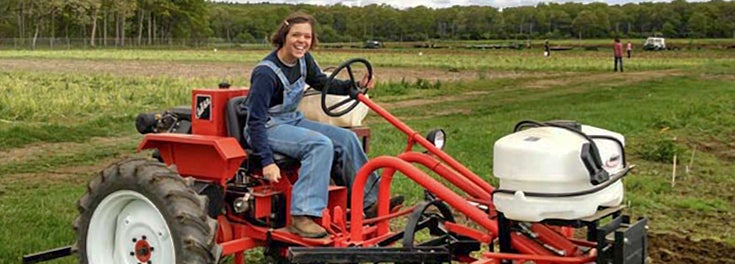
Sustainable agriculture and the Slow Food movement are big at URI. And now the University is offering a new major that focuses on food production and how it affects the environment and society.
The B.S. degree program in sustainable agriculture and food systems is the perfect choice for students interested in careers in sustainable food production, food security, food safety, and food marketing and distribution.
An interdisciplinary major, this new undergraduate program allows students to learn about the food chain from farm to plate to waste and back, emphasizing sustainability, human health and resilience from economic, environmental and societal viewpoints.
Agriculture, human health, negative effects on the environment, global warming, increasing population, hunger and poverty are all tied together. The new major combines all those topics into one.
According to Professor Marta Gomez-Chiarri, coordinator of the new major, graduates of the program may end up working in small or large scale food production and harvesting; developing or enforcing policies that ensure food security and safety; or finding innovative, healthy and safe ways to distribute and market food.
“What’s unique about our program compared to others around the country is that ours will have a coastal focus, integrating sustainable seafood with all the other foods that other programs emphasize,” she said.
Plenty of students have already expressed an interest in the new program, and it’s the interdisciplinary nature of the program that is driving that interest. Students in the social sciences want to know more about food production, while those studying the production side want to understand more about the social and health implications.
One such student is Gennifer Keller, a sophomore studying environmental science and natural resource economics, who said the new major is “the future.”
“Life revolves around food, and if we cannot feed our growing population, more people will starve,” Keller said. “Agriculture, human health, negative effects on the environment, global warming, increasing population, hunger and poverty are all tied together. The new major combines all those topics into one.”
Beyond this exciting new major, there are a variety of ways students can learn more about and actively promote healthy, sustainable food. Among them is Slow Food URI, a student group that hosts events to encourage students to become more aware of where their food comes from and all the steps involved in producing and delivering it.
“Slow food is the opposite of fast food,” explained senior nutrition major Kayleigh Hill, president of the organization. “We try to focus on eating locally and making more local food available in the dining halls. It’s important to know what you’re eating and its effect on the people in your community.”
